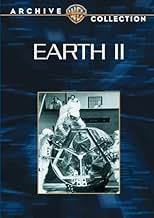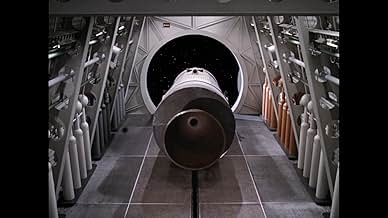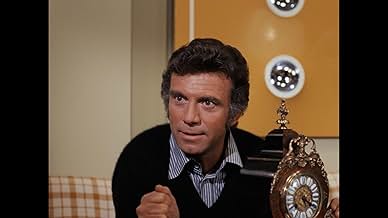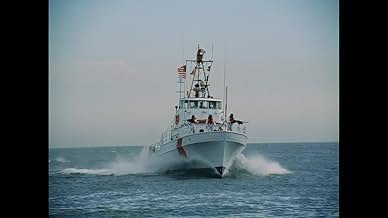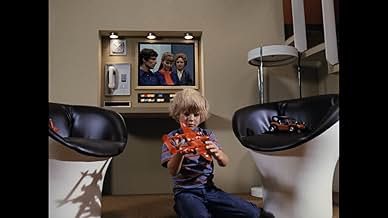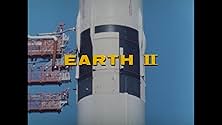AVALIAÇÃO DA IMDb
5,5/10
461
SUA AVALIAÇÃO
Adicionar um enredo no seu idiomaWhen Earth II, an orbiting research space station, is menaced by a Red Chinese nuclear weapon, its 2,000 inhabitants take action to disarm and dispose of the missile without resorting to vio... Ler tudoWhen Earth II, an orbiting research space station, is menaced by a Red Chinese nuclear weapon, its 2,000 inhabitants take action to disarm and dispose of the missile without resorting to violence.When Earth II, an orbiting research space station, is menaced by a Red Chinese nuclear weapon, its 2,000 inhabitants take action to disarm and dispose of the missile without resorting to violence.
- Direção
- Roteiristas
- Artistas
Anthony Franciosa
- Frank Karger
- (as Tony Franciosa)
Edward Michael Bell
- Anton Kovalefskii
- (as Edward Bell)
- Direção
- Roteiristas
- Elenco e equipe completos
- Produção, bilheteria e muito mais no IMDbPro
Avaliações em destaque
A couple of years before Gene Roddenberry was trying to start new series with his movies "Genesis II" and "Planet Earth" (or is that "movie"?), this superior film with the oddly similar name paved the way. Alas, the road came to a dead-end, as all movies of this kind in the early '70s failed to understand that good story is better than bad sfx. This one is about a space station that has a unique social structure intended to eliminate conflict. The concept was handled in a simplistic way, but it nevertheless had a kind of wistful hopefulness about it that seemed not entirely incredible in 1971.
Like Roddenberry's films, this one fits into a short-lived era of TV sf that seemed suspended between Chesley Bonestell's airbrushed vision of the near future of space colonization, and Ralph McQuarrie's grittier, plumber's-nightmare versions that would soon follow. A bit of "2001" can be seen here and there as well (for example, when the characters walk "up" a wall).
If you liked the kind of austere models and similarly inornate acting (scripts, too) of early '70s sf, you'll like this one. The dilemma faced by the characters is familiar, as is its solution (but please overlook the glaring error involving the sun, the Earth, and the station's rotation). Still, there's a lost sense of "coming real soon now" in modern sf that this film might bring back to your memory. In 1971, it seemed we were _all_ going to fly in space and get to walk up walls. You know what happened next, but you didn't see it coming when this movie was new, so you believed it more then than you would today. See it again, if you get the chance, and ask yourself how we lost interest in going into orbit ourselves.
Like Roddenberry's films, this one fits into a short-lived era of TV sf that seemed suspended between Chesley Bonestell's airbrushed vision of the near future of space colonization, and Ralph McQuarrie's grittier, plumber's-nightmare versions that would soon follow. A bit of "2001" can be seen here and there as well (for example, when the characters walk "up" a wall).
If you liked the kind of austere models and similarly inornate acting (scripts, too) of early '70s sf, you'll like this one. The dilemma faced by the characters is familiar, as is its solution (but please overlook the glaring error involving the sun, the Earth, and the station's rotation). Still, there's a lost sense of "coming real soon now" in modern sf that this film might bring back to your memory. In 1971, it seemed we were _all_ going to fly in space and get to walk up walls. You know what happened next, but you didn't see it coming when this movie was new, so you believed it more then than you would today. See it again, if you get the chance, and ask yourself how we lost interest in going into orbit ourselves.
Everyone is talking about how EARTH II was ahead of its time with special effects, scientific imaginings, and the like. I was, however, a little more down to earth. The people who worked up this film did not have their feet on the ground.
Here's the premise: An international project sends up a huge space station and populates it with about a hundred people from various nations. The USSR is represented but not China - because the Chinese had a bad attitude about it. Instantly the US President (Lew Ayres) tells the inmates of this space station that they are now a new and independent nation, he (evidently without the advice and consent of Congress) is recognizing it as a new nation and he's going to have the UN make it a member state. This is absurd on a number of levels include any business about the exchange of ambassadors.
Additionally, the technology pretty much does their thinking for them. In a ship-wide video discussion of a crucial problem of international relations, the ship's computers analyze each person's argument and put subtitles on the screen with disparaging labels about their contribution -- e.g. "Appeal to authority".
Apart from this, the interesting stuff (the special effects) is about a Chinese nuclear satellite that is being used to the homelands of the inmates of this space station.
So, comic book logic, impressive special effects.
Here's the premise: An international project sends up a huge space station and populates it with about a hundred people from various nations. The USSR is represented but not China - because the Chinese had a bad attitude about it. Instantly the US President (Lew Ayres) tells the inmates of this space station that they are now a new and independent nation, he (evidently without the advice and consent of Congress) is recognizing it as a new nation and he's going to have the UN make it a member state. This is absurd on a number of levels include any business about the exchange of ambassadors.
Additionally, the technology pretty much does their thinking for them. In a ship-wide video discussion of a crucial problem of international relations, the ship's computers analyze each person's argument and put subtitles on the screen with disparaging labels about their contribution -- e.g. "Appeal to authority".
Apart from this, the interesting stuff (the special effects) is about a Chinese nuclear satellite that is being used to the homelands of the inmates of this space station.
So, comic book logic, impressive special effects.
TV film about a space station.
This should have been so much better than it is. It had the effects budget, it had the great cast, it had the quality writers (who also worked on TV's Voyage to the Bottom of the Sea) and even some of the music cues were good - so what happened??
About half way into it all anyone can talk about is a bomb in space.
Such a waste of great talent and effects. Towards the end I was so bored I was looking at my phone half the time. Don't bother with Earth II.
This should have been so much better than it is. It had the effects budget, it had the great cast, it had the quality writers (who also worked on TV's Voyage to the Bottom of the Sea) and even some of the music cues were good - so what happened??
About half way into it all anyone can talk about is a bomb in space.
Such a waste of great talent and effects. Towards the end I was so bored I was looking at my phone half the time. Don't bother with Earth II.
Earth II was a very earnest attempt at serious science fiction, a decided rarity in the early 1970s. It dealt with the establishment of the first orbital space colony in an unspecified year. Today, 28 years later, it's interesting to see many of the ideas represented here creeping toward reality. Only now is the International Space Station being constructed, and it bears a passing resemblance to the fictional Earth II. Both are designed to be independent of any one nation. There's a mention of a Mars mission under construction at E-II, much as today's planners say the ISS is essential to a manned mission to Mars. The early lifting-body shuttle of E-II is finally being realized in the X-33 and the VentureStar spacecraft.
Scientific jargon abounds in this picture, and it's to the movie's credit that it's more often than not used properly rather than as technobabble. The writers, with help from technical advisors and NASA, were respectful of the science -- an extraordinary step for SF movies, especially on television. This is a thinking person's science fiction, with complex situations and human interactions rather than space battles, bumpy-headed aliens, ray guns, post- apocalyptic mutants and the like.
The inspiration and influences of "2001: A Space Odyssey," two years previous, are obvious. First and foremost was the presence of Gary Lockwood, who played Frank Poole in 2001. There's also the reverence of the spaceflight sequences that bear a striking resemblance to their predecessors. Contemporary orchestral music takes the place of classical music from the masters, still trying hard to show the majesty and reality of space. The first third of the movie is spent introducing the wonders of living in this new environment with its unfamiliar physical conditions and a unique social structure very much a product of idealistic 1960s egalitarianism. Adult residents of Earth II were mandated to "attend" all important community functions via TV, and any inaccuracies and unsupported opinions on both sides of the debate were instantly pointed out by on-screen captions. If only today's voters could be as well-informed and responsible.
Where this movie founders somewhat is in its pacing. Sometimes it can be tough slogging, seeming quite a bit longer than its 1:45 running time. It's talky at times, even preachy in spots. A saving grace is that, despite the inescapable aging of much of the technology, the production design holds up remarkably well. There are a few set pieces that are blatantly '70s, but more that would still look good today.
One big, unnecessary dramatic device: If they needed to keep the launch bay out of the sun, why send a tug out to stop the rotation of Earth II? It would have been easier to park the tug in front of the missing hatch, providing shade for the bay, just as the real-life Skylab astronauts rigged a "parasol" to keep their workshop cool after it lost its meteoroid shield on launch.
That this movie was as well-crafted as it was despite notable flaws is a reflection on the crew. Many were involved with "Mission: Impossible," including the producers/writers, cinematographer, and composer Lalo Shifrin. The M:I connection also explains the backdrop of political tension as they tried to deal with an orbital nuclear weapon launched by a rogue nation. This is the movie's one glaring anachronism: Communist China was the nation, unaffiliated with the United Nations, that launched the weapon. It was terrible timing that after the movie was finished but only a month before it was aired, the UN adopted Resolution 2758, which stripped Taiwan of its membership and gave its seat to China. By 1979, the US had followed suit, recognizing China and leaving Taiwan in the diplomatic limbo in which it has existed ever since. There was no way to fix this problem before the movie aired. They needed a nuclear nation unconstrained by international agreements, and China was the last such candidate for the role at the time.
From the credits listing "guest stars" and "special guest star," it's clear that this was intended to be the pilot for an ongoing series. Too bad it was never to be. Now we can only guess at what heights this intriguing concept might have reached.
Scientific jargon abounds in this picture, and it's to the movie's credit that it's more often than not used properly rather than as technobabble. The writers, with help from technical advisors and NASA, were respectful of the science -- an extraordinary step for SF movies, especially on television. This is a thinking person's science fiction, with complex situations and human interactions rather than space battles, bumpy-headed aliens, ray guns, post- apocalyptic mutants and the like.
The inspiration and influences of "2001: A Space Odyssey," two years previous, are obvious. First and foremost was the presence of Gary Lockwood, who played Frank Poole in 2001. There's also the reverence of the spaceflight sequences that bear a striking resemblance to their predecessors. Contemporary orchestral music takes the place of classical music from the masters, still trying hard to show the majesty and reality of space. The first third of the movie is spent introducing the wonders of living in this new environment with its unfamiliar physical conditions and a unique social structure very much a product of idealistic 1960s egalitarianism. Adult residents of Earth II were mandated to "attend" all important community functions via TV, and any inaccuracies and unsupported opinions on both sides of the debate were instantly pointed out by on-screen captions. If only today's voters could be as well-informed and responsible.
Where this movie founders somewhat is in its pacing. Sometimes it can be tough slogging, seeming quite a bit longer than its 1:45 running time. It's talky at times, even preachy in spots. A saving grace is that, despite the inescapable aging of much of the technology, the production design holds up remarkably well. There are a few set pieces that are blatantly '70s, but more that would still look good today.
One big, unnecessary dramatic device: If they needed to keep the launch bay out of the sun, why send a tug out to stop the rotation of Earth II? It would have been easier to park the tug in front of the missing hatch, providing shade for the bay, just as the real-life Skylab astronauts rigged a "parasol" to keep their workshop cool after it lost its meteoroid shield on launch.
That this movie was as well-crafted as it was despite notable flaws is a reflection on the crew. Many were involved with "Mission: Impossible," including the producers/writers, cinematographer, and composer Lalo Shifrin. The M:I connection also explains the backdrop of political tension as they tried to deal with an orbital nuclear weapon launched by a rogue nation. This is the movie's one glaring anachronism: Communist China was the nation, unaffiliated with the United Nations, that launched the weapon. It was terrible timing that after the movie was finished but only a month before it was aired, the UN adopted Resolution 2758, which stripped Taiwan of its membership and gave its seat to China. By 1979, the US had followed suit, recognizing China and leaving Taiwan in the diplomatic limbo in which it has existed ever since. There was no way to fix this problem before the movie aired. They needed a nuclear nation unconstrained by international agreements, and China was the last such candidate for the role at the time.
From the credits listing "guest stars" and "special guest star," it's clear that this was intended to be the pilot for an ongoing series. Too bad it was never to be. Now we can only guess at what heights this intriguing concept might have reached.
This was one of the most expensive TV movies of its day. It is heavily indebted to 2001: a Space Odyssey. The action takes place on Earth II which is a space station which orbits Earth and has been designated an independent nation. Its denizens are peace loving and anti-violence but this is thrown into disarray when the Chinese send out a vessel carrying nuclear warheads. For the most part this is a pretty interesting bit of sci-fi, with the Earth II itself making for an interesting setting - I guess the producers thought this too given it was intended for a TV series. The story does get a little too bogged down with the nefarious Chinese vessel though, with the attention of the narrative switching solely onto this for the second half. The set design and model work is the strength here, with the story and dramatics under-cooked. Still, despite its flaws, it still made for a pleasing bit of serious-minded TV sci-fi from the post-2001 days.
Você sabia?
- CuriosidadesFailed pilot for a TV series. Despite a big write up in TV Guide magazine, it failed to win a sizable audience.
- Erros de gravaçãoThere are many places in the space station where zero gravity would cause things to float away. However, this is potentially explained around the 15 minute mark with a reference to "magnetized floors." It's also possible that other objects such as a brief case, items on a desk, and so on are also magnetized, preventing them from floating away. However, unmagnetized objects such as hair would still float freely in zero g.
Principais escolhas
Faça login para avaliar e ver a lista de recomendações personalizadas
Detalhes
- Tempo de duração
- 1 h 38 min(98 min)
- Mixagem de som
- Proporção
- 1.33 : 1
Contribua para esta página
Sugerir uma alteração ou adicionar conteúdo ausente


